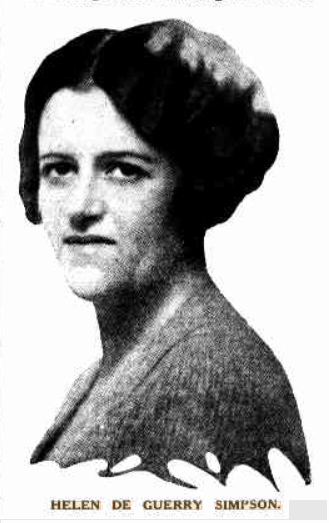by Helen Simpson (1897-1940)
BOOK ONE (i)
The year, eighteen hundred and thirty-one. The place, Sydney; a city
whose streets were first laid by men in chains for the easier progress of
the soldiers who guarded I them. This city, growing slowly about a
population of convicts and soldiers, had at that date no very penitential
air. The harbour water, lively with sun; the many windmills, leisurely
bestirring themselves; the ships at anchor, hung with marine laundry,
ensigns trailing; the smoke of domestic chimneys: all these things
contrived to lend Sydney an air of expectancy rather than despair. Maps
show where the habitations were gathered; they were not many, though
diarists and letter-writers of the period agree that they were tasteful,
and showed up cleanly against the dark universal background of trees.
“Not,” says one lady, “that I should like it in a picture so well as
our softer and more rounded perspective, but in a new place, where one
likes to see everything plainly, it is very pleasant.”
So much for maps and for prose. Poetry of the place and period lacks, or
is not much to the purpose. Still, the Chancellor of the University of
Cambridge did, in the year 1823, announce Australia as the subject with
which his would-be medallists must concern themselves; and since one of
the unsuccessful competitors was William Charles Wentworth, born in the
new continent, his descriptions must be allowed to possess some
authority. After an account of Cook’s discovery, with a digression upon
the fate of La Perouse, Mr. Wentworth proceeds:
Lo! thickly planted o’er the glassy bay,
Where Sydney loves her beauties to survey,
And ev’ry morn, delighted, sees the gleam
Of some fresh pennant dancing in her stream,
A masty forest, stranger vessels moor
Charg’d with the fruits of every foreign shore.
While landward—the thronged quay, the creaking crane,
The noisy workmen, and the loaded wain,
The lengthen’d street, wide square, and column’d front
Of stately mansions, and the gushing font,
The solemn church, the busy market throng,
And idle loungers saunt’ring slow among—
Shew that the mournful genius of the plain
Driv’n from his primal solitary reign,
Has backward fled, and fixed his drowsy throne
In untrod wilds, to muse and brood alone.
His account almost fills in the picture, which yet needs to complete it a
sense that this new country was no mere, copy of the old, but had already
taken on a character of its own, defiant, tough, indolent; as though the
idle loungers of Mr. Wentworth’s poem were to be viewed with their hats
cocked, pulling in their belts upon hunger with a laugh, and having a
loaded pistol somewhere ready about them which they were prepared upon
slight occasion to use. There was freedom, derived as usual from slavery.
There was money, derived about equally from labour, land, and luck. There
were social gatherings, junketings, as there are upon a ship in
mid-ocean. And for the whole company of exiles, bond or free, there was
hope.
It will be seen that Sydney, in the year 1831, may very well serve as
setting for a highly-coloured, improbable, and yet simple story.
[Continues here.]
~
References
Helen Simpson, Under Capricorn (London: William Heinemann, 1937) – available online at Project Gutenberg Australia (text) and Internet Archive (scan). Text copied from Project Gutenberg Australia.
Image sourced from: “Helen de Guerry Simpson: The Australian authoress; interviewed by Kathleen Ussher (London)“, Sydney mail, 4 Mar 1931: 22.






“There was freedom, derived as usual from slavery.” That’s a sharp insight. I assume she means the freedom of the settlers is dervived from the slavery of the convicts.